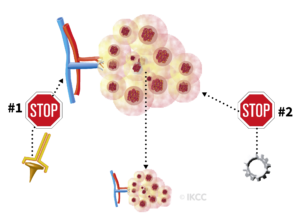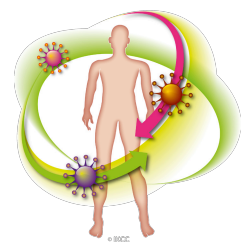kidney cancer streads to what parts of the body
In people with advanced kidney cancer, where the cancer has spread to afar organs, the cancer is normally not completely curable. The goal of treatment is therefore to make life as long and as normal as possible. Combinations of unlike treatments may be recommended past unlike doctors, including urologists, medical oncologists who prescribe anti-cancer medications, and radiation oncologists who care for people with radiations. Throughout, this team of specialists will work with you and your family doctor to help you control your symptoms and live equally normal a life every bit possible.
Treatments for advanced kidney cancer include:
Active Surveillance (Ascertainment):
 In some people in whom the kidney cancer has spread, the cancer might be growing then slowly that the correct first option is to lookout carefully. This is especially the case when the cancer has been discovered past blow. If the cancer starts to grow speedily or cause symptoms then active treatments volition be recommended. A minor percentage of patients might live without symptoms from the cancer for a very long time, sometimes years, so your doctor might advise you to observe for a period of time.
In some people in whom the kidney cancer has spread, the cancer might be growing then slowly that the correct first option is to lookout carefully. This is especially the case when the cancer has been discovered past blow. If the cancer starts to grow speedily or cause symptoms then active treatments volition be recommended. A minor percentage of patients might live without symptoms from the cancer for a very long time, sometimes years, so your doctor might advise you to observe for a period of time.
Surgery to remove cancer that has spread:
 In a very small number of people, the cancer spreads to simply one or two places; if this is the instance it tin exist possible to try to cut out all the metastatic cancers (a "metastectomy"). Some patients tin live a very long fourth dimension in these circumstances, merely information technology actually only applies to patients where there is only one or 2 spots elsewhere and they tin all be safely removed.
In a very small number of people, the cancer spreads to simply one or two places; if this is the instance it tin exist possible to try to cut out all the metastatic cancers (a "metastectomy"). Some patients tin live a very long fourth dimension in these circumstances, merely information technology actually only applies to patients where there is only one or 2 spots elsewhere and they tin all be safely removed.
Surgery to remove cancer in the kidney:
 If your wellness is otherwise adept, there is evidence that removing the original cancer in the kidney improves survival and helps other treatments piece of work amend. This "cytoreductive" nephrectomy would be performed past your urologist (or uro-oncologist).
If your wellness is otherwise adept, there is evidence that removing the original cancer in the kidney improves survival and helps other treatments piece of work amend. This "cytoreductive" nephrectomy would be performed past your urologist (or uro-oncologist).
Clinical Trials:
 A clinical trial is sometimes erroneously perceived as a "last resort", but with speedily improving treatments it should be considered the "commencement port of call". A clinical trial is a way of testing new treatments, or older treatments used in a new way. Clinical trials are not right for every person; non every person is correct for a clinical trial. If a clinical trial is available it can exist an interesting opportunity to consider.
A clinical trial is sometimes erroneously perceived as a "last resort", but with speedily improving treatments it should be considered the "commencement port of call". A clinical trial is a way of testing new treatments, or older treatments used in a new way. Clinical trials are not right for every person; non every person is correct for a clinical trial. If a clinical trial is available it can exist an interesting opportunity to consider.
Radiation therapy:
 A Radiation Oncologist uses high-energy radiations to impale cancer cells. Radiations can be very helpful if the cancer causes a lot of problems in i location, e.g. cancer in the bone causing pain, cancer in the kidney causing haemorrhage, cancer in the brain causing swelling. Radiations is used equally a means of controlling symptoms (due east.grand. hurting). SBRT (stereotactic body radiation therapy) is increasingly used to control kidney cancer growth.
A Radiation Oncologist uses high-energy radiations to impale cancer cells. Radiations can be very helpful if the cancer causes a lot of problems in i location, e.g. cancer in the bone causing pain, cancer in the kidney causing haemorrhage, cancer in the brain causing swelling. Radiations is used equally a means of controlling symptoms (due east.grand. hurting). SBRT (stereotactic body radiation therapy) is increasingly used to control kidney cancer growth.
Palliative care:
 Palliation doesn't mean the "end of the route" or that the cancer is in its terminal stages. Palliative care is all the treatments that your squad recommends to improve your symptoms and improve your quality of life. Your family doctor, your medical oncologist and your other doctors volition assist y'all with this. Sometimes palliative intendance physicians and nurses are consulted, and they can often provide specialised advice. Palliative handling can meliorate quality of life by alleviating symptoms associated with advanced cancer.
Palliation doesn't mean the "end of the route" or that the cancer is in its terminal stages. Palliative care is all the treatments that your squad recommends to improve your symptoms and improve your quality of life. Your family doctor, your medical oncologist and your other doctors volition assist y'all with this. Sometimes palliative intendance physicians and nurses are consulted, and they can often provide specialised advice. Palliative handling can meliorate quality of life by alleviating symptoms associated with advanced cancer.
Culling Therapies:
 Everyone wants the best health intendance for themselves and their loved ones. If in that location are no suitable standard medical therapies available, "alternative" therapies might be proposed past well-intentioned friends, relatives or internet web-pages. These are chosen "culling" because they have not been scientifically proven to compress cancers or help patients. Worse still, they might take been proven not to assist or to even cause impairment. Examples of unhelpful or harmful culling "treatments" include mega-dose vitamins, herbal products or extreme diets. Some alternative therapies tin can interfere with medicines normally prescribed by a doctor, causing harm to the patient. So it's of import to inform your doctor or nurse if y'all are considering these therapies.
Everyone wants the best health intendance for themselves and their loved ones. If in that location are no suitable standard medical therapies available, "alternative" therapies might be proposed past well-intentioned friends, relatives or internet web-pages. These are chosen "culling" because they have not been scientifically proven to compress cancers or help patients. Worse still, they might take been proven not to assist or to even cause impairment. Examples of unhelpful or harmful culling "treatments" include mega-dose vitamins, herbal products or extreme diets. Some alternative therapies tin can interfere with medicines normally prescribed by a doctor, causing harm to the patient. So it's of import to inform your doctor or nurse if y'all are considering these therapies.
Complementary Therapies:
On the other hand, complementary therapies can "complement" established medical treatments, improving quality of life and symptoms. These include mindfulness meditation, relaxation techniques, remedial massage therapy, psychotherapy, prayer, yoga, acupressure and acupuncture. If in that location were any adventure that the kidney cancer has spread to bones, chiropractic or osteopathy would not be a skilful idea.
Targeted Therapy
 Chemotherapy is not used in kidney cancer. Targeted therapy is based on medications (usually pills) that stop claret supply to the cancer, which slows or stops the growth of the tumour, and sometimes causes information technology to shrink. These medications target specific signals within the cancer, and are also called "targeted therapies" (come across graphic #1).
Chemotherapy is not used in kidney cancer. Targeted therapy is based on medications (usually pills) that stop claret supply to the cancer, which slows or stops the growth of the tumour, and sometimes causes information technology to shrink. These medications target specific signals within the cancer, and are also called "targeted therapies" (come across graphic #1).

Other names for this group of drugs are "anti-angiogenic therapies" and "tyrosine kinase inhibitors". While these medications are non chemotherapy, they do have side effects. The tyrosine kinase inhibitors used to treat kidney cancer are: axitinib, cabozantinib, lenvatinib, pazopanib, sorafenib, sunitinib. Some other medication, bevacizumab, is an intravenous targeted therapy.
Medications that block cancer's growth
A second group of medicines for kidney cancer work by blocking a different signal ("mTOR inhibitors"). The mTOR inhibitors (meet graphic #2) used to treat kidney cancer are everolimus and temsirolimus.
Immunotherapy with cytokines
 Earlier 2006, immunotherapy with cytokines such equally interleukin-two (IL-2) and blastoff-interferon was commonly used to treat kidney cancer that had spread to other parts of the torso (metastatic kidney cancer). These drugs worked for some people by activating killer T cells, which are the part of the torso's immune organization that destroys cancer cells. New kinds of allowed therapies are condign available and are existence tested in clinical trials.
Earlier 2006, immunotherapy with cytokines such equally interleukin-two (IL-2) and blastoff-interferon was commonly used to treat kidney cancer that had spread to other parts of the torso (metastatic kidney cancer). These drugs worked for some people by activating killer T cells, which are the part of the torso's immune organization that destroys cancer cells. New kinds of allowed therapies are condign available and are existence tested in clinical trials.
Immunotherapy with checkpoint antibodies
Checkpoint antibodies, besides chosen immuno-oncology (IO) therapy (e.chiliad. CTLA-four, PD-1, PD-L1) are the well-nigh recent development in the immune therapy of kidney cancer. Immune cells are controlled by a committee of checkpoints which very finely rest the immune system. Too picayune regulation and the immune arrangement goes overactive and attacks the body; too much and immune functions are impaired and infections and cancers tin institute themselves.
Sometimes cancer cells co-opt this system and employ checkpoints inappropriately to end your allowed organisation recognising cancer cells. Checkpoint inhibitors are drugs (in this case antibodies) that in plough cake these checkpoints and so that the allowed system is freed upwardly to fight cancer cells.
Think treatment, think trial
 Many clinical trials are underway around the earth that are either specifically for kidney cancer, or that include kidney cancer in the selection criteria.
Many clinical trials are underway around the earth that are either specifically for kidney cancer, or that include kidney cancer in the selection criteria.
Source: https://ikcc.org/kidney-cancer-spread-parts-body-treatment-i-take/

0 Response to "kidney cancer streads to what parts of the body"
Enregistrer un commentaire